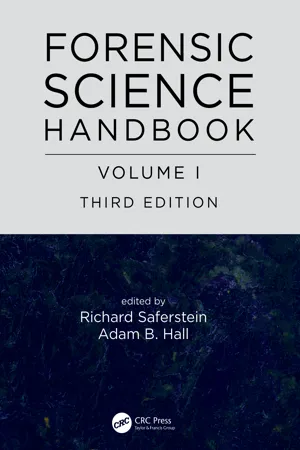
Forensic Science Handbook, Volume I
- 692 pages
- English
- ePUB (mobile friendly)
- Available on iOS & Android
Forensic Science Handbook, Volume I
About this book
Originally published in 1982 by Pearson/Prentice-Hall, the Forensic Science Handbook, Third Edition has been fully updated and revised to include the latest developments in scientific testing, analysis, and interpretation of forensic evidence. World-renowned forensic scientist, author, and educator Dr. Richard Saferstein once again brings together a contributor list that is a veritable Who's Who of the top forensic scientists in the field. This Third Edition, he is joined by co-editor Dr. Adam Hall, a forensic scientist and Assistant Professor within the Biomedical Forensic Sciences Program at Boston University School of Medicine. This two-volume series focuses on the legal, evidentiary, biological, and chemical aspects of forensic science practice.
The topics covered in this new edition of Volume I include a broad range of subjects including:
• Legal aspects of forensic science
• Analytical instrumentation to include: microspectrophotometry, infrared Spectroscopy, gas chromatography, liquid chromatography, capillary electrophoresis, and mass spectrometry
• Trace evidence characterization of hairs, dust, paints and inks
• Identification of body fluids and human DNA
This is an update of a classic reference series and will serve as a must-have desk reference for forensic science practitioners. It will likewise be a welcome resource for professors teaching advanced forensic science techniques and methodologies at universities world-wide, particularly at the graduate level.
Frequently asked questions
- Essential is ideal for learners and professionals who enjoy exploring a wide range of subjects. Access the Essential Library with 800,000+ trusted titles and best-sellers across business, personal growth, and the humanities. Includes unlimited reading time and Standard Read Aloud voice.
- Complete: Perfect for advanced learners and researchers needing full, unrestricted access. Unlock 1.4M+ books across hundreds of subjects, including academic and specialized titles. The Complete Plan also includes advanced features like Premium Read Aloud and Research Assistant.
Please note we cannot support devices running on iOS 13 and Android 7 or earlier. Learn more about using the app.
Information
Table of contents
- Cover
- Half Title
- Title Page
- Copyright Page
- Dedication
- Contents
- Preface
- About the Editors
- Contributors
- Chapter 1: Legal Aspects of Forensic Science
- Chapter 2: Forensic Paint Examination
- Chapter 3: The Forensic Identification and Association of Human Hair
- Chapter 4: A Guide to the Analysis of Forensic Household Dust Specimens and Their Statistical Significance
- Chapter 5: Fundamentals of Visible Microspectrophotometry in Forensic Science
- Chapter 6: Infrared Spectroscopy in the Forensic Sciences: A Comprehensive Discussion
- Chapter 7: Forensic Characterization and Comparisons of Inks
- Chapter 8: Forensic Gas Chromatography
- Chapter 9: Forensic Applications of High-Performance Liquid Chromatography and Capillary Electrophoresis
- Chapter 10: Forensic Mass Spectrometry: Analytical Advancements and Casework Applications
- Chapter 11: Analysis of Body Fluids in Sexual Assault Cases
- Chapter 12: The Application of Capillary Electrophoresis in Forensic DNA Analysis
- Index